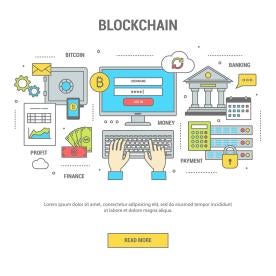You have probably heard the term “blockchain,” most likely in the context of Bitcoin. You have also probably seen splashy headlines suggesting that blockchain is the next game-changing technology that will upend the business world. This article will demystify blockchain technology and identify some of its potential applications for human resources (HR).
What Is Blockchain?
While the first application of blockchain involved cryptocurrency, blockchain’s use cases extend far beyond electronic currency. Stated simply, blockchain is a distributed ledger or database that is shared across a computing network. In a centralized ledger, there is one centralized repository of records (like a bank) that moves data (like currency) to people or institutions. In a distributed ledger (like blockchain), the ledger or database is copied and shared by all parties so that each participant has a simultaneous copy of all transactions. Think of it as a spreadsheet that is duplicated thousands of times across a network of computers. Blockchain databases are structured to be secure and are said to be very difficult to hack because of the complex cryptography imbedded in the blockchain and the distributed nature of the ledger.
Blockchains can be public (and thus permissionless), like the Internet, or private (and thus permissioned), like an intranet. Businesses are generally more interested in private, permissioned blockchains, which would allow only preapproved users to access or join the blockchain. Blockchains use a variety of mechanisms to verify the identity of users and the validity of transactions. In a permissioned blockchain, the users can agree on the rules that govern how entries are recorded and modified.
What Impact Might Blockchain Have on HR?
It may have a large impact. If widely adopted, blockchain technology has the ability to alter the manner in which information and data impacting the employer-employee relationship is exchanged. Here are a few ways that blockchain could affect basic HR processes:
-
Blockchain resumes: Blockchain technology could allow individuals to maintain and control access to a blockchain-based record of their educational and work histories. Through such a platform, organizations would be able to instantaneously authenticate resume and background information, as the data would have already been verified by virtue of being accepted into the distributed ledger. Multiple technology companies are already working to develop platforms for resume authentication using blockchain technology.
-
Smart contracts: Smart contracts are computer programs that control the transfer of digital assets between parties. They can be structured with terms similar to those in standard contracts, but through the use of blockchain technology, they can automatically execute on obligations through electronic triggers tied to the conditions established in the contracts. With the gig economy and the increasing number of contract workers, smart contracts can allow for open, transparent, and electronically controlled transactions between employers and contracted entities or individuals.
-
Cross-border payments: Particularly as it relates to international payments, blockchain can have advantages for payroll. Typically, international payments require multiple intermediary banks and third parties. Technology companies are developing platforms using blockchain, as well as mobile and cloud technology, to facilitate cross-border payments using Bitcoin as a payment rail through which employees and contractors could be paid in their desired local currency.
Again, this is not an exhaustive list of the use cases for blockchain in HR, and it is important to note that the legal issues related to this technology (for example, data privacy, jurisdiction, and liability issues) have yet to be fleshed out in any meaningful way. Currently, only eight states have adopted any form of legislation touching on blockchain technology; the lack of regulatory certainty is one of a number of barriers currently blocking its widespread adoption.
This Sounds Interesting, but Is It Really Going to Happen?
Blockchain’s uses are still being developed, and its ultimate utility will depend on consortiums of industries, companies, and organizations accepting and adopting the technology. Nevertheless, technology leaders predict that blockchain will have an enormous impact on the way that businesses share information. For example, one report predicted that by 2030, blockchain will have widespread adoption and generate an annual business value of $3 trillion. HR leaders may want to stay aware of developments in this space as this technology continues to mature and expand.




 i
i


